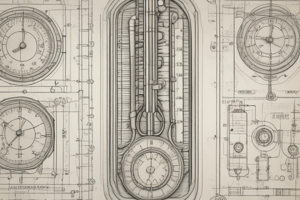Podcast
Questions and Answers
¿Qué proceso se utiliza para comparar un instrumento de medición con un estándar para determinar su precisión?
¿Qué proceso se utiliza para comparar un instrumento de medición con un estándar para determinar su precisión?
- Homologación
- Verificación
- Calibración (correct)
- Ajuste
La trazabilidad se refiere a la capacidad de un resultado de medición para relacionarse con referencias estatuidas a través de una cadena de comparaciones.
La trazabilidad se refiere a la capacidad de un resultado de medición para relacionarse con referencias estatuidas a través de una cadena de comparaciones.
True (A)
¿Cuál de los siguientes tipos de metrología se centra en los procesos industriales para asegurar la precisión y exactitud?
¿Cuál de los siguientes tipos de metrología se centra en los procesos industriales para asegurar la precisión y exactitud?
- Metrología Fundamental
- Metrología Industrial (correct)
- Metrología Ambiental
- Metrología Científica
La metrología ambiental se ocupa de las mediciones relacionadas con la salud y dispositivos médicos.
La metrología ambiental se ocupa de las mediciones relacionadas con la salud y dispositivos médicos.
¿Cuál es uno de los beneficios económicos de la metrología?
¿Cuál es uno de los beneficios económicos de la metrología?
¿Cuál es el sistema de unidades reconocido internacionalmente?
¿Cuál es el sistema de unidades reconocido internacionalmente?
Los _____ deben ser accesibles para todos los sectores para garantizar la correcta implementación de la metrología.
Los _____ deben ser accesibles para todos los sectores para garantizar la correcta implementación de la metrología.
Relaciona las áreas de impacto de la metrología con su descripción:
Relaciona las áreas de impacto de la metrología con su descripción:
La __________ es el grado de cercanía de los valores medidos al verdadero valor de la cantidad que se mide.
La __________ es el grado de cercanía de los valores medidos al verdadero valor de la cantidad que se mide.
Relaciona los siguientes términos de metrología con su definición:
Relaciona los siguientes términos de metrología con su definición:
Flashcards
Metrología
Metrología
La ciencia de la medición, que abarca todos los aspectos, desde el desarrollo de estándares hasta la aplicación de herramientas de medición.
Estándar
Estándar
Una cantidad o objeto definido y aceptado utilizado como base para la medición.
Unidad de Medida
Unidad de Medida
Una cantidad específica de una propiedad física particular, definida por un estándar y utilizada como referencia en la medición.
Precisión
Precisión
Signup and view all the flashcards
Incertidumbre
Incertidumbre
Signup and view all the flashcards
¿Qué es la trazabilidad?
¿Qué es la trazabilidad?
Signup and view all the flashcards
¿Qué es la calibración?
¿Qué es la calibración?
Signup and view all the flashcards
¿Para qué sirve la metrología?
¿Para qué sirve la metrología?
Signup and view all the flashcards
¿Qué desafíos enfrenta la metrología?
¿Qué desafíos enfrenta la metrología?
Signup and view all the flashcards
¿Cuál es la importancia de la metrología?
¿Cuál es la importancia de la metrología?
Signup and view all the flashcards
Study Notes
Introduction to Metrology
- Metrology is the science of measurement, encompassing all aspects of measurement, from the development of standards to the application of measurement tools.
- It involves the establishment of units of measurement, the calibration of instruments, and the comparison of measurements to ensure accuracy and comparability.
- Metrology plays a crucial role in various fields, including science, engineering, industry, and commerce.
- It ensures reliability, consistency, and accuracy in measurements across different contexts and scales.
Fundamental Concepts in Metrology
- Standard: A defined and accepted quantity or object used as a basis for measurement.
- Unit: A specific quantity of a particular physical property, defined by a standard and used as a reference in measurement.
- Measurement: The process of determining the quantitative value of a physical property.
- Accuracy: The degree of closeness of measured values to the true value of the quantity being measured.
- Precision: The degree of closeness of repeated measurements to each other.
- Uncertainty: A parameter associated with the result of a measurement that characterizes the dispersion of the values that could reasonably be attributed to the measurand.
Types of Metrology
- Fundamental Metrology: Deals with the definition and realization of fundamental physical units.
- Industrial Metrology: Focuses on accuracy and precision in industrial processes for manufacturing.
- Legal Metrology (Industrial Metrology): Applies legal aspects to ensure measurement instruments conform to regulations.
- Scientific Metrology: Used for precision measurements in scientific investigations. It often drives improvements in the instruments of fundamental metrology.
- Environmental Metrology: Measurments for monitoring and regulating environmental factors like pollution.
- Biomedical Metrology: Applies metrology principles to health and medical devices.
- Geodetic Metrology: Deals with geospatial measurements for mapping and surveying.
Measurement Standards
- International System of Units (SI): The internationally recognized system of units based on seven fundamental units.
- National Standards Laboratories: Institutions maintaining and distributing national standards for all units of measurement.
- Traceability: The property of a measurement result whereby it can be related to stated references, usually national or international standards, through an unbroken chain of comparisons all having stated uncertainties.
Measurement Instruments and Techniques
- Calibration: The process of comparing a measurement instrument to a standard to determine its accuracy.
- Calibration standards: Instruments whose values are known to a higher level of accuracy and used as reference in calibration.
- Various techniques: Ranging from simple rulers to sophisticated electronic instrumentation, including complex algorithms for data reduction and analysis.
Importance of Metrology
- Quality Control: Ensures consistency and accuracy in manufacturing processes.
- Scientific Discovery: Provides precision in scientific experiments and data collection.
- Safety and Regulation: Allows compliance with safety standards and legal regulations.
- Economic Benefits: Improves efficiency in production, reduces errors, and promotes international trade.
- Technological Advancement: Driven by the demand for higher accuracy and precision measurements in emerging technologies.
Challenges in Metrology
- Maintaining accuracy and reproducibility over time. Standards need meticulous care.
- Development of new measurement techniques for emerging technologies. Metrology is constantly being updated.
- Ensuring compatibility and interoperability. Data must share formats across multiple institutions and systems.
- Keeping pace with technological advancements. New types of measurement demand new instruments.
- Ensuring standards are accessible to all sectors. Access to calibrated measurement instruments is crucial.
Conclusion
- Metrology is a critical discipline with far-reaching implications for various fields.
- It establishes a foundation of trust and confidence in measurement processes.
- Accurate and reliable measurements are fundamental to progress in science, technology, and society.
Studying That Suits You
Use AI to generate personalized quizzes and flashcards to suit your learning preferences.





